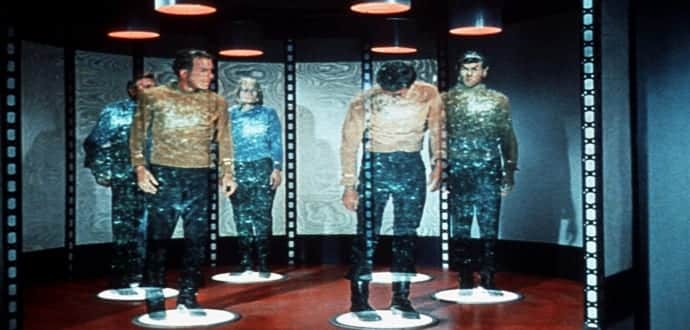Russia aim to make Star Trek-style teleportation a reality within 20 years
If you have been a avid Star Trek follower you may have seen Captain Kirk and Spock beam themselves upto to some different planet as a click of a button. The legendary dialogue by Captain Kirk, ‘Beam Me Up Scotty‘ looks to be reality soon. Russia is embarking on a ambitious Star Trek style teleporatation program and its research program has received financial backing from the Russian government. The program seems to be part of a new Kremlin drive to encourage Russia’s IT sector and high-tech economy.
A proposed multi-trillion pound strategic development program drawn up for Vladimir Putin would seek to develop teleportation by 2035. According to Kommersant, the $2.1 trillion (£1.4 trillion) “road map” for development of the cybernetics market to 2035 also includes developing a Russian computer programming language, secure cybernetic communications, quantum computing, and neural interfaces (direct connections between computers and human brains).
“It sounds fantastical today, but there have been successful experiments at Stanford at the molecular level,” Alexander Galitsky, a prominent investor in the country’s technology sector, told Russia’s Kommersant daily on Wednesday. “Much of the tech we have today was drawn from science fiction films 20 years ago.”
While the concept of people teleporting from one place to another remains in the realm of fantasy, the Star-Trek style target is listed in the National Technological Initiative, a state-sponsored strategic development plan created to fund research and development sector in a number of key sectors.
However, the goal is not as far-fetched as it may sound.
Ilya Massukh, head of the Informational Democracy Fund NGO, told Kommersant that because of science’s rapid development it is necessary to make plans 15 to 20 years in advance.
“It is important to have intermediate goals to have an opportunity to correct the road map and its realization in order not to get involved in knowingly utopian spheres,” he said.
For the first time in 2014, scientists at Delft University of Technology in the Netherlands presented that it was possible to teleport information programmed into sub-atomic particles between two points three metres apart with 100% dependability.
Even though teleportation remains a remote prospect, experts believe that the next few decades will likely see significant progress in quantum computing and neural interfaces.
Looking to create its own version of Elon Musk’s hyperloop, The network would link Western Russia to the Far East and the northern reaches of the enormous country, with the first section of the network linking St. Petersburg to Moscow in order to transport cargo the 400 miles (640 km) from Baltic Sea terminals.
Earlier this week, Mr Putin showered praise on Russia’s IT sector when he met a team of programmers from St. Petersburg State University who won the 2016 international “Programming Olympiad.”
Russia not only has a talented programming community but also a small and lively software sector that has created many successful IT companies, including Kaspersky Labs and Yandex.
Western governments are also of the opinion that Russia has leveraged its computing talent to make one of the most impressive state-sponsored hacking and cyber-warfare programs in the world.
